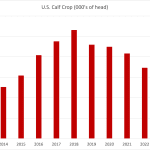By Commodity News Service Canada
Winnipeg, Dec. 4 (CNS) – Following are a few highlights in
the Canadian and world feed grains markets on Monday, Dec. 4.
Barley will benefit from the warmer temperatures and
increased humidity that comes with climate change, according to
new research at the University of Alberta. Researchers looked
decades ahead to assess the water footprint related to barley
and the beef industry, finding that rain-fed barley crops in
northern Alberta will increase, while irrigation-fed crops in
the south will remain stable, requiring less water for
Read Also
ICE Canola Midday: Losing ground in ‘direction-less’ trade
By Glen Hallick Glacier FarmMedia | MarketsFarm – Canola futures on the Intercontinental Exchange slipped back late Friday morning, in…
barley production will be cut between 10 and 60 per cent for
most rain-fed and irrigated barley.
Southern parts of New South Wales in Australia were hit by
80 millimetres of rain over the weekend, according the Australia
Broadcasting Corporation. With the large amount of rain received
the expected bumper harvest of milling wheat is now expected to
be downgraded to feed quality.
Feed wheat bids in the key cattle feeding area of
Lethbridge, Alberta were in the C$220 to C$230 per tonne range
as of Dec. 1, which is slightly higher from the previous week,
according to the latest pricing information from the provincial
government. Feed barley prices rose approximately C$5, coming in
Feed barley prices in Saskatchewan and Manitoba held steady
overnight, according to the latest information from the Prairie
Ag Hotwire. Prices in Saskatchewan were at C$3.75 per bushel and
C$3.55 per bushel in Manitoba. Feed wheat prices as well held
steady in Saskatchewan at C$5 per bushel.










